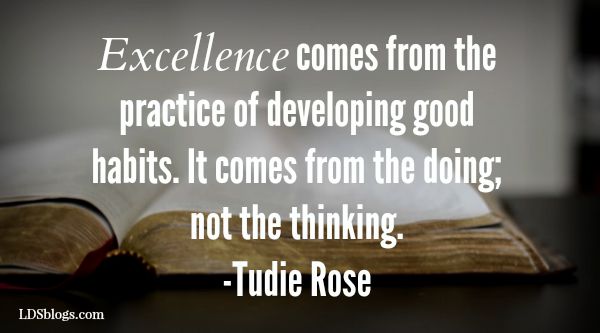We are what we repeatedly do. Excellence, then, is not an act, but a habit. — This has been attributed to Aristotle, but there is evidence that it was actually Will Durant in The Story of Philosophy: The Lives and Opinions of the World’s Greatest Philosophers
During the times in my life when I have been reading the scriptures every day, I notice a difference in my attitude. Unfortunately, I sometimes get off track. There have been periods when I haven’t read the scriptures with any regularity. A year ago, a friend asked me to participate in an online reading assignment of a few verses every day. The assignment includes a question to answer regarding the reading. My friend and I do the reading separately, answer the question, and write down any other thoughts we have about the reading assignment. Then we share our thoughts with each other. Sometimes as we read each other’s notes, it spurs questions for interesting discussion. The funny thing about this is that after a year, if I miss a day, I feel empty. Daily scripture reading has finally become a habit for me.
Habits are interesting things because they don’t happen overnight, nor do they happen because you tell yourself you’re going to do them. Habits only become habits from the actually doing.
I have a lot of bad habits to demolish, but that only happens by working to turn bad behavior into good habits—again, it is the doing that counts. I can tell myself from now until the cows come home that I’m going to get more exercise, but until I actually get out of my chair and do it, exercise won’t be a habit for me.
 We are what we repeatedly do. If I continue to read the scriptures daily, I will eventually become what God wants me to be. On the other hand, if I continue in couch potato mode, I will continue to carry too much weight on my bad back and ankles. It is the doing that makes the difference between excellence and failure.
We are what we repeatedly do. If I continue to read the scriptures daily, I will eventually become what God wants me to be. On the other hand, if I continue in couch potato mode, I will continue to carry too much weight on my bad back and ankles. It is the doing that makes the difference between excellence and failure.
I’ve heard that if you do something for a week, it becomes a habit. I’ve also heard it takes two or three weeks. I suppose it depends on the individual. The point is that we should figure out what length of time constitutes a habit for us, set our goal, and then do it until it becomes habit. Once we have mastered one habit, then we can take on another one. We can make our lives a continual good habit factory.
Good habits are not acquired simply by making good resolves, though the thought must precede the action. Good habits are developed in the workshop of our daily lives. It is not in the great moments of test and trial that character is built. That is only when it is displayed. The habits that direct our lives and form our character are fashioned in the often uneventful, commonplace routine of life. They are acquired by practice (Elder Delbert L. Stapley, “Good Habits Develop Good Character,” Oct. 1974 General Conference).
In other words, practice makes perfect. Excellence comes from the practice of developing good habits. It comes from the doing; not the thinking. Thinking is where we begin. We develop the plan for good habits by thinking, but the habit itself doesn’t come until we put the plan into practice and make the habit a reality. I can say I’m going to be a kind person all I want, but I will only become a kind person when I develop the habit of being kind to all I meet. Once I have done that, I will have developed excellence in kindness.
Since we are told “Be ye therefore perfect” (Matthew 5:48), I must assume that our Heavenly Father expects us to use this time on earth as our school for developing and practicing the good habits that will form our character for the eternities. We are expected to school ourselves to be excellent in all good things. Obviously, we are not expected to be perfect overnight; this is to be a life-long learning experience. We are in elementary school and have not yet advanced to high school and college. The point is that we are to begin the process.
There are some things that take me longer to learn than others. Possibly, it is because it takes me more time to warm up to certain habits than others. Sometimes I stray from an already developed habit and have to backtrack and make something a habit all over again. (Hopefully, that doesn’t happen too often.) As long as we are constantly trying, we’ll be okay. Heavenly Father understands we are in the infancy of our eternal progression. All He expects is that we continue to try. The atonement of Jesus Christ takes care of the rest.
This is a thoughtful period of my life, and I’m constantly setting new goals and striving to develop good habits. I often feel like I’m playing catch up, and that I should be farther along in the character department. It is those times when I stop and remind myself that I’m human and that I’m trying my best. While we strive for excellence, we know that we won’t attain that ultimate goal in this lifetime. We are only expected to try our best.
About Tudie Rose
Tudie Rose is a mother of four and grandmother of ten in Sacramento, California. You can find her on Twitter as @TudieRose. She blogs as Tudie Rose at http://potrackrose.wordpress.com. She has written articles for Familius. You will find a Tudie Rose essay in Lessons from My Parents, Michele Robbins, Familius 2013, at http://www.familius.com/lessons-from-my-parents.
Twitter •







